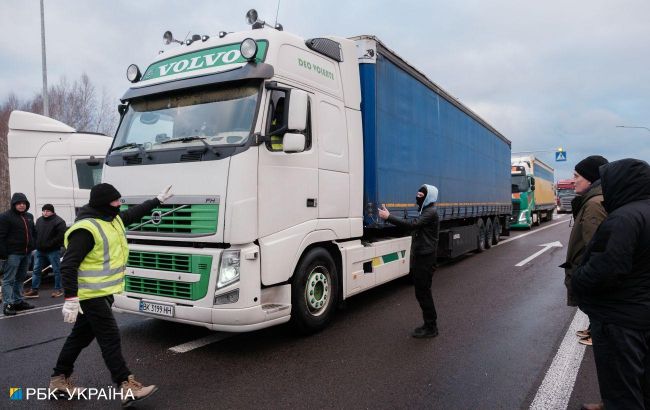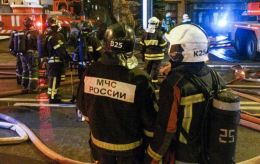Why Polish farmers are protesting and whether new blockade of border with Ukraine possible
 Archive photo: A queue of trucks against the backdrop of protests at the Polish border, November 2023 (Vitalii Nosach/RBC-Ukraine)
Archive photo: A queue of trucks against the backdrop of protests at the Polish border, November 2023 (Vitalii Nosach/RBC-Ukraine)
The border between Ukraine and Poland may once again be blocked. At least partially, as Polish farmers have announced a protest action.
RBC-Ukraine reports on what is happening now and the reason.
Contents
- Where and when the border blockade may start
- Local authorities do not support the protest
- Farmers win court case and prepare to block the border
- What is known about the reasons for a possible blockade
- How the border with Ukraine was previously blocked in Poland
Where and when the border blockade may start
According to the State Customs Service of Ukraine, local farmers have announced a new protest action based on information from the Polish side.
It is expected that they may block vehicle movement in front of the Medyka - Shehyni border crossing from October 8 to December 31, 2024. Currently, the processing of vehicles is proceeding as usual.
"In the event of a strike and further changes in the situation, we will inform you additionally," the customs office noted.
According to the Western Regional Directorate of the State Border Guard Service, as of 3:00 PM Kuiv time, there were no issues with crossing the border from the Ukrainian side. However, Ukrainians are advised to consider the potential instability of electronic systems at the border crossings.
There are no significant queues at the border with Poland. About 25 passenger cars were lined up at the Ustyluh border crossing. The situation is clear at other crossings, including Yahodyn, Uhryniv, Rava-Ruska, Hrushei, Krakovets, Smolnytsia, and Shehyni (where a protest is announced near Medyka).
The Polish Border Guard service indicated that as of 2:00 PM Kyiv time, there could be delays of up to two hours in processing trucks at Medyka.
Local authorities do not support the protest
The large-scale blockade of the border in 2023-2024 began with protests from Polish carriers who opposed Ukrainian drivers transporting goods without special permits. This was even though there is a transport visa-free regime between Ukraine and the European Union.
According to them, competition from Ukraine allegedly pushed them out of the market. Since then, Medyka has become a site of ongoing protests. Queues of Ukrainian trucks reached Rzeszów (almost 100 km), and parking lots were filled with heavy vehicles. Later, farmers from the Podkarpacka Oszukana Wies association, dissatisfied with the supplies of Ukrainian grain, joined the blockade.
The reason for the potential October blockade is now said to be not Ukrainian grain and carriers but violations of the agreement with the Polish government.
However, the local authorities in the Medyka commune did not allow the action. They noted that problems at the border crossing potentially "threaten property on a large scale." Experience from last year showed that this led to reduced trade and financial losses for Polish companies.
Mayor Magdalena Małachowska noted that, as usual, the protesters intended to block the national road, which had been blocked many times in the past. She mentioned that it is uncertain how long the blockade would last and under what conditions, as the plans regarding this issue are constantly changing. She expressed her responsibility to care for the residents and users of the road, emphasizing that such protests create significant queues.
According to her, ordinary residents should not suffer due to the protests, as the target audience is government bodies. She also suggested organizing a protest near the voivodeship office in Rzeszów.
One of the protesters' demands is to maintain the agricultural tax at last year's level, which does not benefit either the budget of Medyka or any other municipality in Poland.
"No farmer has asked our commune to cancel or reduce the agricultural tax, so why should we agree to this protest if our farmers do not support this demand?" she added.
Farmers win court case and prepare to block the border
Members of Podkarpacka Oszukana Wies challenged the mayor's position last Friday. Yesterday, the district court in Przemyśl issued a ruling.
"The mayor lost the case; the court lifted her ban. There will be a protest, and we are already starting to organize it. The judge said that farmers can protest in any way they see fit, as they have that right granted by the constitution," said union leader Roman Kondrów.
According to him, the action was planned for September, but there was a harvest festival, and then floods began in Poland, making it "inappropriate" to start a protest.
"After the court's decision, we can resume the blockade, although we don't know if the mayor will appeal the court's ruling to a higher instance. It will be like before: we will block trucks while allowing cars and buses to pass to maintain the flow of traffic as it was before," he emphasized.
Participants in the action will pay special attention to trucks carrying agricultural products and food entering Poland and heading towards Ukraine.
According to information on the union's Facebook page, the protest may last from October 8 to December 31. The start time for the border blockade in Medyka has not been specified.
It is not yet certain that the blockade will begin today. Polish media report that farmers want to first assist those affected by the floods in the southwest.
"We are sending additional grain trucks; that is our top priority. But at the same time, we are preparing a protest action to block the border. It is just a matter of time before we return to the blockades and start the second round of our protests," added Roman Kondrów.
What is known about the reasons for a possible blockade
The main reason for the possible blockade is the failure of Minister of Agriculture Czesław Siekierski to fulfill commitments regarding the agricultural tax. "Earlier, we lifted the blockade because he and the voivode signed such an agreement in my presence. But we have yet to see it implemented," Kondrów said.
This concerns the promised exemptions on the agricultural tax. Previously, the parties agreed to cancel the fourth tax payment, but the government has backed away from its own words.
Another reason is the reduction of rates for so-called eco-schemes. Farmers are disappointed as they expected financial inflows at the 2023 level. However, subsidy rates have been cut by nearly 40%.
For example, for comprehensive crop production, the payment will be 810.96 zł per hectare, which is 553 zł less than last year when it was 1363.77 zł.
"They have cut our eco-schemes. Those such as comprehensive production, simplified growing systems, mixing straw with soil, or biological pest control have been reduced by 40-50%. We do not understand this. The government said it would do better, and now they are cutting us back as much as they can," farmers complain.
How the border with Ukraine was previously blocked in Poland
Due to the Russian invasion in 2022, Ukraine lost the ability to transport goods by air and sea. To support the economic sector, it was agreed to cancel customs duties and implement a visa-free transport arrangement with the EU.
The blockade of the Polish-Ukrainian border began on November 6, 2023. Polish carriers demanded the return of the practice of issuing permits for Ukrainian drivers, reducing their number to pre-war levels, and allowing empty Polish trucks to leave Ukraine out of turn.
As a result, the throughput decreased to one truck per hour. Ukraine established a special headquarters for drivers blocked on the Polish side. The blockade at all checkpoints ceased in mid-January 2024.
However, protests by farmers began in February, culminating in Poles dumping grain from a freight wagon near Medyka. In response to their actions, Ukrainian carriers blocked the checkpoints on their side.
In March, President Volodymyr Zelenskyy stated that it was time to find a solution to a situation that had "long gone beyond both economics and morality." In mid-April, Polish Prime Minister Donald Tusk urged farmers to end the blockade, emphasizing that Ukraine was in an extremely difficult position.
Notably, the protests exhibited signs of Russian influence. In particular, the blockade was promoted by the Polish far-right Confederation of Freedom and Independence which spread Kremlin propaganda and anti-Ukrainian sentiments.
The blockade was lifted on April 29, but some short-term actions were still conducted in May and June. The registration and processing of trucks began to be conducted in a normal mode. At the same time, trucks carrying grain could only transit through Polish territory.
As of January 2024, according to calculations by the Deputy Head of the All-Ukrainian Agrarian Council, Denys Marchuk, the blockade of the western border caused the Ukrainian economy to lose over 1.5 billion euros.
Sources: statements from the State Customs Service, the Western Regional Department of the State Border Guard Service, data from Polish border guards, a statement from the Polish farmers' association Podkarpacka Oszukana Wies, and materials from local media.

